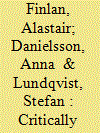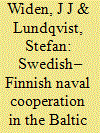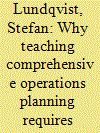| Srl | Item |
| 1 |
ID:
179966


|
|
|
| 2 |
ID:
121076


|
|
|
|
|
| Publication |
2013.
|
| Summary/Abstract |
This article analyses the alteration of the referent object for maritime security from protection of shipping and port facilities to protection of citizens and national economies. It presents a tentative answer on the extent and consequences of this alteration applied by states in a global perspective, and focuses on validating four explanatory factors on why the alteration has occurred. The time period of study is between 1991 and 2013. Its results illustrate a transition in states' security policies from traditional expressions of maritime security to broader security perspectives, and also indicates radically altered maritime strategic perspectives among states.
|
|
|
|
|
|
|
|
|
|
|
|
|
|
|
|
| 3 |
ID:
142308


|
|
|
|
|
| Summary/Abstract |
The new US maritime strategy has received praise from many corners of the world. As a manual it is well suited to guide the efforts of its three sea services in navigating a challenging global security environment in the years ahead. The strategy emphasises maritime presence, both where conflict threatens the global system and US national interests, and where allies require reassurance, particularly in the Indo-Pacific region. However, Stefan Lundqvist and J J Widen argue that the document fails, to some extent, to address Russia's increasingly challenging conduct and its implications for Northeast Europe and the Baltic Sea region.
|
|
|
|
|
|
|
|
|
|
|
|
|
|
|
|
| 4 |
ID:
148051


|
|
|
|
|
| Summary/Abstract |
Recently, Finland and Sweden decided to substantially deepen their defence cooperation and this project involves creating a bilateral standing Naval Task Group (SFNTG). The present article aims at examining the deepening naval cooperation between Finland and Sweden from a regional integration perspective, focusing on its motives, current challenges and future prospects. Driven by perceptions of common challenges and desires for cost-effectiveness, and strengthened by recent successes on sea surveillance and a combined Amphibious Task Unit, the bilateral project has considerable potential to achieve success. To fulfil its objectives, substantial legal changes in both countries are required to allow the use of force on each other’s territorial waters. To cater for the requirement of not conflicting with EU, NORDEFCO or NATO cooperations, the bilateral Task Group must operate according to NATO standards and by using English as the language in command and control. The costs of adjusting the naval units to NATO’s technical requirements are far from negligible and this issue still remains to be solved. If Finland and Sweden manage to incorporate new policies, common structures and common organisational norms among their navies, an even deeper integration, as in Belgium and the Netherlands, are conceivable.
|
|
|
|
|
|
|
|
|
|
|
|
|
|
|
|
| 5 |
ID:
139210


|
|
|
|
|
| Summary/Abstract |
This article argues that the method outlined in NATO’s Comprehensive Operations Planning Directive (COPD) manual is entirely based on systems theory and describes how to apply the principles for managing system change through comprehensive operations projects. Such systems thinking is based on conceptually different principles than traditional military planning methods. Students must therefore be provided with new conceptual tools to understand and handle the complex planning process outlined in the COPD manual. Thereto, they require knowledge of its founding scientific theories to meet academic standards. The concluding message is that military teachers and students must widen their individual mental frames of reference through a transformational learning process to obtain the comprehensive understanding required to fully manage the COPD process. Moreover, they need to prepare for facilitating dialogues in the less mature comprehensive operations planning teams of real-life situations.
|
|
|
|
|
|
|
|
|
|
|
|
|
|
|
|